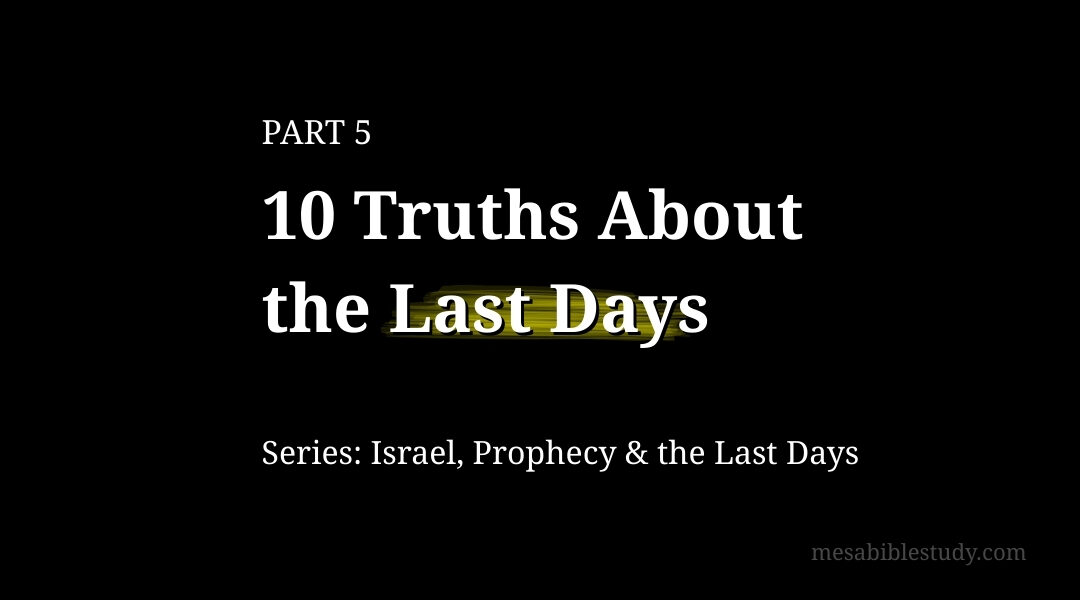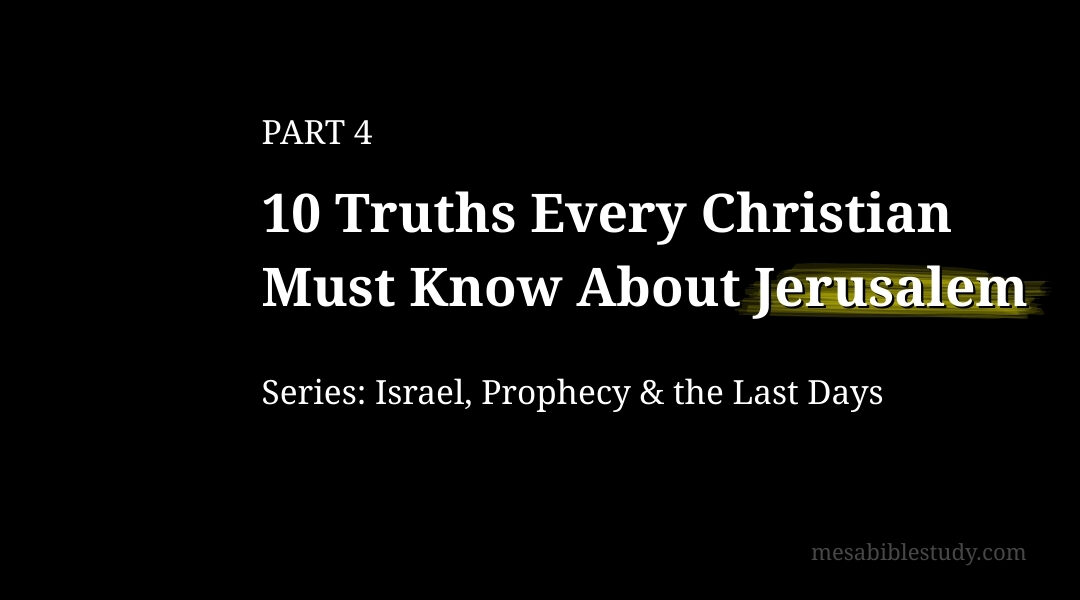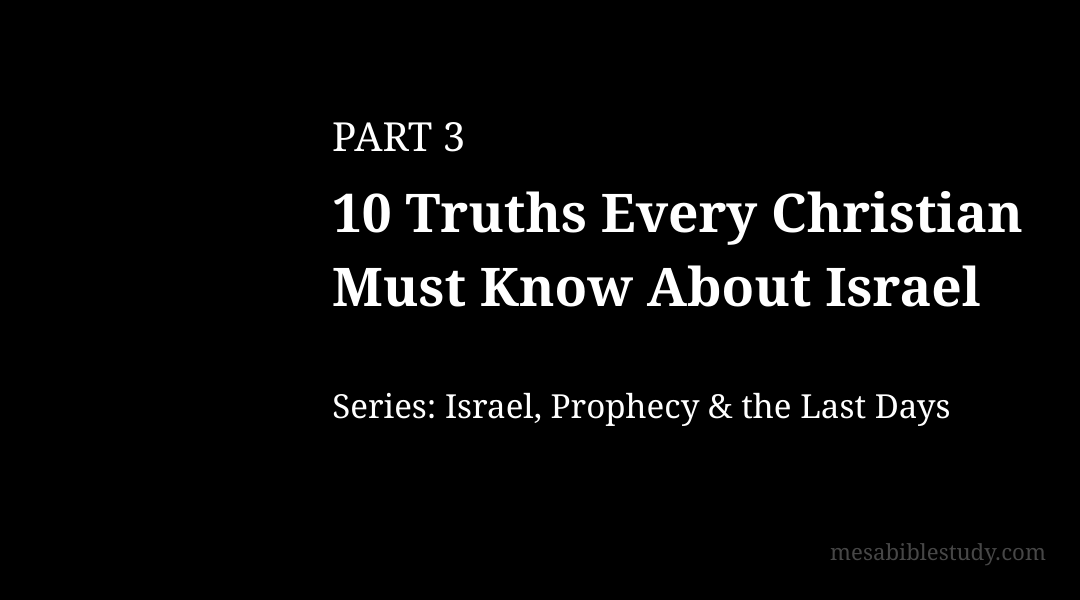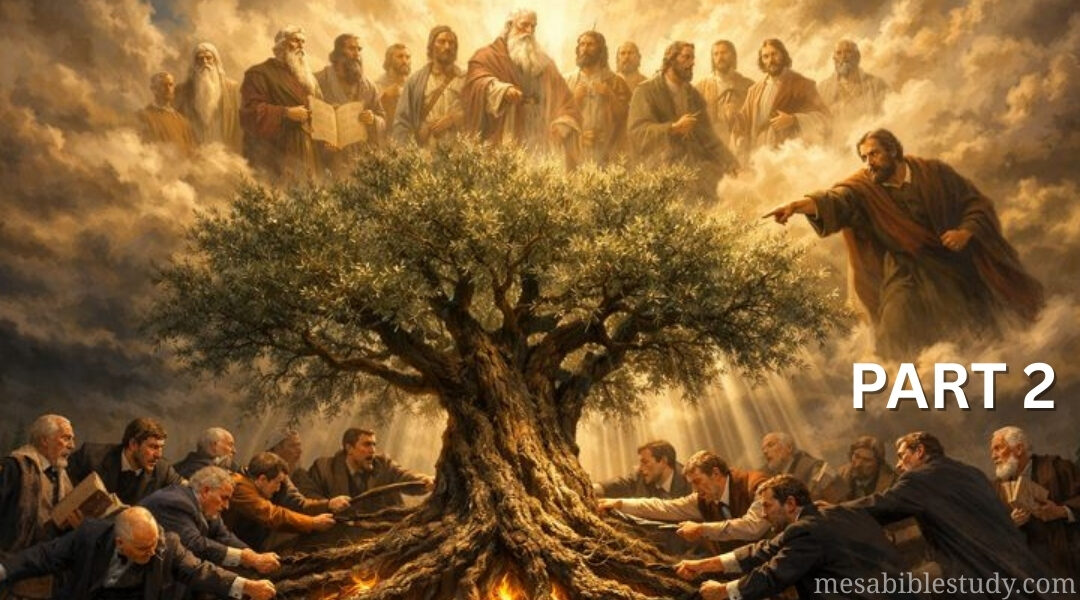
by Jamie Pantastico | Jan 17, 2026 | Israel and Bible Prophecy |
Biblical clarity in an age of confusion, fear, and deception
Few topics create more confusion in the Church than “the last days.”
Some are driven by fear.
Others by speculation.
Many by sensationalism.
But Scripture is not unclear.
God has revealed what we need to know, when we need to know it, and to whom it applies.
These 10 truths establish a clear, Pauline, biblical framework so believers can understand the times without panic, paranoia, or distortion.
Truth #1: The “last days” began in the first century—but the final phase will be marked by convergence.
Biblically, the last days began with Christ’s death, resurrection, and ascension.
“God… has in these last days spoken to us by His Son.”
— Hebrews 1:2
But Scripture also teaches that the end of the age will be marked by simultaneous convergence, not isolated events:
- Israel restored
- global instability
- apostasy in the Church
- moral collapse
- technological control systems
- hostility toward truth
We are witnessing convergence—not coincidence.
Truth #2: Israel—not the Church—is God’s prophetic time clock.
Jesus told His disciples to watch Israel, not Rome.
“When you see Jerusalem surrounded by armies…”
— Luke 21:20
Prophecy revolves around:
- Israel
- Jerusalem
- the nations
- the covenants
The Church is not the subject of end-times prophecy.
Israel is.
This distinction protects believers from confusion and fear.
Truth #3: The Church is not appointed to the wrath of the Tribulation.
Paul is unequivocal:
“God did not appoint us to wrath.”
— 1 Thessalonians 5:9
The Tribulation is:
- Jacob’s Trouble (Jer. 30:7)
- Daniel’s 70th Week (Dan. 9:24–27)
- judgment on the nations
- discipline and restoration for Israel
It is not for the Body of Christ.
Truth #4: The next prophetic event is the catching away of the Body of Christ.
The Rapture is:
- imminent
- signless
- distinct from the Second Coming
- a comfort, not a warning
“For the Lord Himself will descend from heaven… and we shall be caught up.”
— 1 Thessalonians 4:16–17
We are not watching for Antichrist.
We are watching for Christ.
Truth #5: The Antichrist cannot be revealed until the Church is removed.
Paul clarifies this precisely:
“That Day will not come unless the falling away [departure] comes first…”
— 2 Thessalonians 2:3
“He who now restrains will do so until He is taken out of the way.”
— 2 Thessalonians 2:7
The restrainer—the Holy Spirit working through the Body of Christ—must be removed before the man of sin can be revealed.
The Church will not identify the Antichrist.
The world will—after we are gone.
Truth #6: Apostasy in the Church is a major sign of the times.
Paul warned:
“In the last days perilous times will come.”
— 2 Timothy 3:1
This apostasy includes:
- rejection of sound doctrine
- denial of biblical authority
- hostility toward Israel
- distortion of the gospel
- celebration of sin
- mockery of prophecy
The danger is not outside the Church—it is within.
Truth #7: Deception will increase before the Rapture—but its fullness comes after.
Jesus’ first warning was deception:
“Take heed that no one deceives you.”
— Matthew 24:4
Before the Rapture, deception:
- prepares
- conditions
- softens resistance
After the Rapture, deception:
- overwhelms
- dominates
- deceives the world
Understanding this distinction preserves peace and confidence.
Truth #8: Globalism is not accidental—it is preparatory.
The Bible foretells:
- global governance (Rev. 13)
- global economy
- global religion
- centralized authority
These systems do not exist yet—but the infrastructure does.
This is stage-setting, not fulfillment.
Truth #9: The nations will be judged by how they treat Israel.
God is explicit:
“I will enter into judgment… on behalf of My people, My heritage Israel.”
— Joel 3:2
Nations rise and fall based on their posture toward Israel—not their power.
This includes Western nations and former Christian strongholds.
Truth #10: The last days end in victory, not defeat.
The Bible does not end with chaos—it ends with Christ reigning.
“The kingdoms of this world have become the kingdoms of our Lord.”
— Revelation 11:15
- Israel restored
- Christ enthroned
- Satan defeated
- righteousness established
- God vindicated
The last days are not something the Church fears—they are something God finishes.
Conclusion: Why These Truths Matter Now
Believers who understand the last days will:
- remain calm
- reject fear-based teaching
- avoid deception
- stand firm in grace
- rightly divide Scripture
- honor God’s prophetic plan
Confusion produces fear.
Clarity produces confidence.
And God has given us clarity—if we will believe His Word.
Explore the Series
← Previous | 📖 Series Home | Next →

by Jamie Pantastico | Jan 17, 2026 | Verse-by-Verse Bible Studies |
📖 Passage Breakdown — Joel 2:28
“And it shall come to pass afterward that I will pour out My Spirit on all flesh; your sons and your daughters shall prophesy, your old men shall dream dreams, your young men shall see visions.”
📌 Prophetic Navigation: Follow the Timeline
Continue the study:
Joel 2:28 promises the future outpouring of God’s Spirit on restored Israel.
Acts 2:16–21 shows Peter identifying Pentecost as a preview, not the fulfillment, of Joel’s prophecy.
Acts 3:19–21 then reveals that Israel’s repentance would bring the return of Christ and the restoration of all things Joel foretold.
Read these passages together to see how God’s prophetic program for Israel unfolds in perfect order.
📜 Background, Setting & Purpose
✍️ Author
Joel, a prophet sent by God to the nation of Israel.
👥 Written To
The people of Judah and Jerusalem.
⏲️ When
Likely between 800–500 B.C., during a time of national judgment and prophetic warning.
🌍 Setting & Purpose of Joel (book-level)
The book of Joel is about:
- The Day of the LORD
- God’s judgment on Israel
- Israel’s future repentance
- Israel’s final restoration
Joel is not writing about the Church.
He is writing about Israel in the last days.
Joel 2 moves from:
- locust judgment
- to future Tribulation
- to Israel’s national restoration
- to the coming of the Kingdom
Joel 2:28 is part of that prophetic timeline.
📖 Immediate Context (Joel 2:18–27)
Before verse 28:
- Israel repents
- God restores the land
- God removes Israel’s reproach
- God dwells in Zion
Only after this restoration does the Spirit get poured out.
Verse 28 begins with “And it shall come to pass afterward” — meaning after Israel’s restoration.
✨ Phrase-by-Phrase Breakdown
“And it shall come to pass afterward…”
This is a time marker.
It does not mean “right away.”
It means after the events of Israel’s national restoration.
This places the verse in Israel’s future, not the present Church Age.
“…that I will pour out My Spirit…”
This is not individual indwelling for salvation.
It is a national, prophetic outpouring.
This fulfills Israel’s covenant promises (Ezekiel 36–37).
“…on all flesh…”
“All flesh” here means:
- all within the nation of Israel
- across age, gender, and social class
Not all humanity — all Israel.
“Your sons and your daughters shall prophesy…”
Prophecy, visions, and dreams are sign gifts tied to Israel’s prophetic program.
They confirm that:
- the Kingdom is near
- God is restoring Israel
- heaven is interacting with earth
❌ What This Verse Does Not Mean
- Not a universal Church Age promise
- Not justification by the Spirit
- Not proof that everyone should prophesy
- Not the normal Christian life today
Pentecost in Acts 2 was a partial, foretaste, not the fulfillment.
✅ What This Verse Does Mean
- God will restore Israel
- God will pour out His Spirit on Israel
- Israel will be prepared for the Kingdom
- The New Covenant will be fully activated
🔗 Cross-References for Going Deeper
Ezekiel 36:26–27
Ezekiel 37
Zechariah 12:10
Acts 2:16–21
Romans 11:25–27
📘 Doctrinal Summary
Joel 2:28 belongs to Israel’s prophetic future, not the present Church Age. It describes the outpouring of the Holy Spirit on the restored nation of Israel in preparation for the coming Kingdom. The prophecy is covenantal, national, and eschatological. Pentecost was not the fulfillment but a preview. To apply Joel 2:28 as a Church Age norm is to confuse Israel’s promises with the Body of Christ’s position. God will fulfill this prophecy exactly as written—when Israel is restored and the Kingdom is at hand.
Explore the Series
← Previous | 📖 Series Home | Next →

by Jamie Pantastico | Jan 16, 2026 | Israel and Bible Prophecy |
Why the most contested city on earth is the centerpiece of God’s plan
Jerusalem is not merely a city of history.
It is the city of prophecy.
From Genesis to Revelation, Jerusalem stands at the center of God’s redemptive and prophetic program. When Christians misunderstand Jerusalem, they inevitably misunderstand Israel, prophecy, and the future Kingdom of Christ.
These are 10 essential truths every believer must understand if they are to read the Bible plainly and discern the times accurately.
Truth #1: God personally chose Jerusalem as His dwelling place.
Jerusalem was not chosen by David, Solomon, or any earthly king.
God chose it Himself.
“For the LORD has chosen Zion;
He has desired it for His dwelling place:
‘This is My resting place forever.’”
— Psalm 132:13–14
God does not abandon what He calls “My resting place forever.”
Truth #2: Jerusalem is the city of the Great King—Jesus Christ.
Jesus spoke of Jerusalem literally, not symbolically.
“Nor by Jerusalem, for it is the city of the Great King.”
— Matthew 5:35
Christ will not reign spiritually from heaven alone.
He will reign physically and visibly from Jerusalem.
Truth #3: Jerusalem is the focal point of biblical prophecy.
Nearly every major prophetic event involves Jerusalem:
- the return of the Jewish people
- the Tribulation
- the siege of the nations
- the repentance of Israel
- the return of Christ
- the establishment of the Kingdom
You cannot remove Jerusalem from prophecy without rewriting Scripture.
Truth #4: Jerusalem will be the target of global hostility in the last days.
God foretold Jerusalem would become the world’s focal point of conflict:
“I will make Jerusalem a cup of trembling to all the surrounding peoples…
And all the nations of the earth are gathered against it.”
— Zechariah 12:2–3
This is not metaphorical.
It is geopolitical—and it is happening now.
Truth #5: Jerusalem will be attacked—but never destroyed again.
Jerusalem will face:
- siege
- betrayal
- global pressure
- invasion
But God promises preservation.
“I will defend this city, to save it.”
— 2 Kings 19:34
“The LORD will go forth and fight against those nations.”
— Zechariah 14:3
Jerusalem’s survival is guaranteed by God Himself.
Truth #6: Jerusalem will be the throne of Christ’s Millennial Kingdom.
Scripture leaves no ambiguity:
“At that time Jerusalem shall be called The Throne of the LORD.”
— Jeremiah 3:17
The Kingdom will be:
- literal
- earthly
- Davidic
- global
- centered in Jerusalem
Christ will rule the nations from Zion.
Truth #7: Jerusalem is where Israel will recognize her Messiah.
The greatest spiritual awakening in history will occur in Jerusalem.
“They will look on Me whom they pierced.”
— Zechariah 12:10
This moment marks Israel’s national salvation (Romans 11:26).
It will not happen in Rome, London, or New York.
It will happen in Jerusalem.
Truth #8: God will vindicate His holy name in Jerusalem before the nations.
God declares:
“I will sanctify My great name… and the nations shall know that I am the LORD.”
— Ezekiel 36:23
The stage of God’s vindication is Jerusalem.
What the nations mock today, God will exalt openly.
Truth #9: Jerusalem divides the faithful Church from the apostate Church.
Watch carefully:
- Apostate Christianity spiritualizes Jerusalem.
- The remnant Church takes God at His Word.
How one treats Jerusalem reveals how one treats Scripture.
Jerusalem is a theological litmus test.
Truth #10: Jerusalem’s story ends in glory, not conflict.
The Bible does not end with destruction—it ends with restoration.
“The New Jerusalem, coming down out of heaven from God.”
— Revelation 21:2
Jerusalem’s future is eternal.
God’s chosen city will stand forever as the center of worship in the ages to come.
Conclusion: Why Jerusalem Still Matters
Jerusalem is not a political inconvenience.
It is not a relic of the past.
Jerusalem is:
- God’s chosen city
- Christ’s future throne
- the focal point of prophecy
- the dividing line of theology
- the stage of redemption’s climax
To dismiss Jerusalem is to dismiss Scripture.
To honor Jerusalem is to honor God’s Word.
Explore the Series
← Previous | 📖 Series Home | Next →

by Jamie Pantastico | Jan 15, 2026 | Israel and Bible Prophecy |
Foundational biblical realities the Church cannot afford to forget
Confusion about Israel does not come from Scripture.
It comes from neglecting Scripture.
When believers stop reading the Bible plainly—especially the prophets and Paul’s explanation in Romans 9–11—Israel becomes a theological problem instead of what God says she is: the covenant nation through whom He reveals His faithfulness to the world.
These are 10 non-negotiable biblical truths every Christian must know if they want to understand God’s plan, prophecy, and the times we are living in.
Truth #1: God Himself chose Israel—and His choice is irrevocable.
Israel exists because God chose her, not because she earned it.
“For you are a holy people to the LORD your God; the LORD your God has chosen you to be a people for Himself.”
— Deuteronomy 7:6
Paul affirms this choice remains in effect today:
“For the gifts and the calling of God are irrevocable.”
— Romans 11:29
If God can revoke His choice of Israel, then no believer has assurance of salvation.
Truth #2: God’s covenants with Israel are unconditional and eternal.
The Abrahamic, Land, Davidic, and New Covenants are not based on Israel’s performance.
They are based on God’s oath.
“I have sworn by Myself…”
— Genesis 22:16
God did not say “If Israel obeys, I will…”
He said “I will.”
Israel’s disobedience affects blessing, not ownership of the promises.
Truth #3: Israel’s current unbelief is temporary and purposeful.
Israel’s spiritual blindness is not accidental—it is part of God’s redemptive plan.
“Blindness in part has happened to Israel until the fullness of the Gentiles has come in.”
— Romans 11:25
The word until matters.
Israel’s unbelief:
- opened the door to Gentile salvation
- allowed the Body of Christ to be formed
- will one day be lifted
This is not replacement.
It is divine sequencing.
Truth #4: God has physically restored Israel to the land—just as He promised.
The prophets spoke repeatedly of a literal regathering after a long dispersion.
“I will take you from among the nations… and bring you into your own land.”
— Ezekiel 36:24
In 1948, after nearly 2,000 years, Israel became an independent nation—an event without parallel in human history.
This was not coincidence.
It was fulfillment.
Truth #5: Israel remains the prophetic time clock of Scripture.
Biblical prophecy does not revolve around:
- America
- Europe
- the Church
- global institutions
It revolves around Israel and Jerusalem.
Key future events tied to Israel include:
- Daniel’s 70th week (Daniel 9:24–27)
- the Tribulation
- the Antichrist’s covenant
- Israel’s national repentance
- the Second Coming
- the Millennial Kingdom
Remove Israel, and prophecy collapses.
Truth #6: The Church does not replace Israel—Gentiles are grafted in.
Paul’s olive tree illustration is explicit:
“You… were grafted in among them.”
— Romans 11:17
Gentiles:
- share in spiritual blessings
- partake of grace
- are members of the Body of Christ
But Israel’s national promises remain Israel’s alone.
Participation is not replacement.
Truth #7: God will one day save Israel nationally.
This is not symbolic.
It is not allegorical.
It is not fulfilled spiritually in the Church.
“And so all Israel will be saved.”
— Romans 11:26 (NKJV)
“They will look on Me whom they pierced.”
— Zechariah 12:10 (NKJV)
Israel’s greatest revival is still future—and it will happen when Christ returns.
Truth #8: Jerusalem is central to Israel’s future and Christ’s Kingdom.
Jerusalem is not optional in Scripture.
“Jerusalem… the city of the Great King.”
— Matthew 5:35 (NKJV)
It will be:
- the throne of Christ
- the capital of the Millennial Kingdom
- the focal point of worship and justice
Any theology that sidelines Jerusalem is out of step with the Bible.
Truth #9: Rising hostility toward Israel is itself prophetic.
God foretold that Israel would become isolated in the last days.
“All nations of the earth are gathered against it.”
— Zechariah 12:3 (NKJV)
This hostility is not evidence God is finished with Israel.
It is evidence prophecy is unfolding.
Israel’s isolation precedes her restoration.
Truth #10: Standing with Israel is obedience to God—not political allegiance.
This has nothing to do with governments or parties.
It has everything to do with God’s Word.
“I will bless those who bless you.”
— Genesis 12:3
To bless Israel is to:
- trust God’s faithfulness
- honor His covenants
- submit to His revealed plan
Christians do not stand with Israel because Israel is perfect.
We stand with Israel because God is faithful.
Conclusion: Why These Truths Matter Now
We are watching a generation of Christians drift—not because Scripture is unclear, but because it is being ignored, spiritualized, or reinterpreted.
These truths:
- anchor faith
- expose deception
- protect believers
- uphold God’s character
- strengthen assurance
- prepare the Church for the days ahead
Israel is not a theological inconvenience.
Israel is the living testimony that God keeps His promises.
Explore the Series
← Previous | 📖 Series Home | Next →

by Jamie Pantastico | Jan 14, 2026 | Israel and Bible Prophecy |
How subtle deception is reshaping Christian thought
The Church is not turning against Israel overnight.
It is happening gradually, through repetition, framing, and selective teaching.
Most believers who are drifting into anti-Israel thinking do not hate God, Scripture, or truth. They love the Lord—but they are being fed lies that sound compassionate, intellectual, and even biblical.
Paul warned us this would happen.
“For the time will come when they will not endure sound doctrine…”
— 2 Timothy 4:3
Below are 10 of the most common lies Christians are being told about Israel today—lies that must be exposed clearly and biblically.
Lie #1: “Israel is no longer God’s chosen people.”
This lie sits at the foundation of nearly every other error.
Scripture does not leave this open to interpretation:
“Has God cast away His people? Certainly not!”
— Romans 11:1
“God has not cast away His people whom He foreknew.”
— Romans 11:2
Israel’s current unbelief does not mean God has rejected them.
It means God is working out His plan exactly as He said He would.
Lie #2: “The Church replaced Israel.”
This is Replacement Theology, whether admitted or not.
Paul never says the Church replaces Israel. He says Gentiles are:
“grafted in among them”
— Romans 11:17
Grafting in is not taking over.
Participation is not replacement.
Gentiles are “Partakers” of the Promises not takers of it all. Paul makes that so clear in Ephesians 3:1-9:
‘For this reason I, Paul, the prisoner of Christ Jesus for you Gentiles— if indeed you have heard of the dispensation of the grace of God which was given to me for you, how that by revelation He made known to me the mystery (as I have briefly written already, by which, when you read, you may understand my knowledge in the mystery of Christ), which in other ages was not made known to the sons of men, as it has now been revealed by the Spirit to His holy apostles and prophets: that the Gentiles should be fellow heirs, of the same body, and partakers of His promise in Christ through the gospel, of which I became a minister according to the gift of the grace of God given to me by the effective working of His power.’
Ephesians 3:1-7
The Church and Israel have distinct identities and roles in God’s plan.
Lie #3: “The promises to Israel were conditional and they failed.”
God did not say, “If you obey, I will keep My covenant.”
He said, “I will.”
“If you can break My covenant with the day and My covenant with the night… then My covenant may also be broken with David.”
— Jeremiah 33:20–21
If Israel’s disobedience could cancel God’s promises, then no believer’s salvation is secure.
Lie #4: “Modern Israel has no connection to biblical Israel.”
This claim ignores both Scripture and history.
The prophets foretold:
- a global scattering
- a long exile
- preservation of identity
- a physical return to the land
- national rebirth
- renewed hostility from the nations
“I will take you from among the nations… and bring you into your own land.”
— Ezekiel 36:24
No other people group fits these prophecies—only Israel.
Lie #5: “Israel is the aggressor and the cause of Middle East instability.”
This is the world’s narrative, not Scripture’s.
Biblically, Israel is:
- surrounded
- pressured
- attacked
- betrayed
- hated
“All nations will gather against Jerusalem.”
— Zechariah 12:3
Portraying Israel as the villain is not neutrality—it is prophetic inversion.
Lie #6: “Christians should distance themselves from Israel for the sake of justice.”
Justice does not mean opposing what God has chosen.
Paul warns Gentile believers:
“Do not boast against the branches.”
— Romans 11:18
You cannot claim moral superiority over the very people through whom God brought:
- Scripture
- the covenants
- the Messiah
This lie breeds arrogance, not righteousness.
Lie #7: “Israel’s unbelief proves God is finished with them.”
Paul addresses this directly:
“Blindness in part has happened to Israel until the fullness of the Gentiles has come in.”
— Romans 11:25
The word “until” destroys Replacement Theology.
Israel’s unbelief is temporary and purposeful, not final.
Lie #8: “Supporting Israel is political, not biblical.”
This is a popular narrative being driven by many conservative pundits and social media influencers like Tucker Carlson.
God’s promise predates modern politics by four thousand years:
“I will bless those who bless you, and I will curse him who curses you.”
— Genesis 12:3
Standing with Israel is not about governments or parties.
It is about aligning with God’s covenant purposes.
Lie #9: “Jerusalem no longer matters.”
God says the opposite:
“I have set My King on My holy hill of Zion.”
— Psalm 2:6
“Jerusalem… the city of the Great King.”
— Matthew 5:35
Jerusalem is:
- the focal point of prophecy
- the future throne of Christ
- the city God defends
- the place of Israel’s future repentance
Dismissing Jerusalem is dismissing prophecy itself.
Lie #10: “God is done with Israel; the future belongs to the Church alone.”
Paul closes the argument decisively:
“And so all Israel will be saved.”
— Romans 11:26
“For the gifts and the calling of God are irrevocable.”
— Romans 11:29
God is not finished with Israel.
God is not confused.
God is not changing plans.
The Church age is a parenthesis of grace, not the cancellation of Israel.
Conclusion: Why These Lies Are So Dangerous
These lies do more than distort theology—they:
- sever Christians from Scripture
- erode confidence in God’s faithfulness
- produce arrogance toward Israel
- prepare hearts for hostility
- weaken discernment in the last days
Paul warned Gentile believers not to be ignorant of this mystery (Romans 11:25).
Ignorance always leads to deception.
Explore the Series
← Previous | 📖 Series Home | Next →




